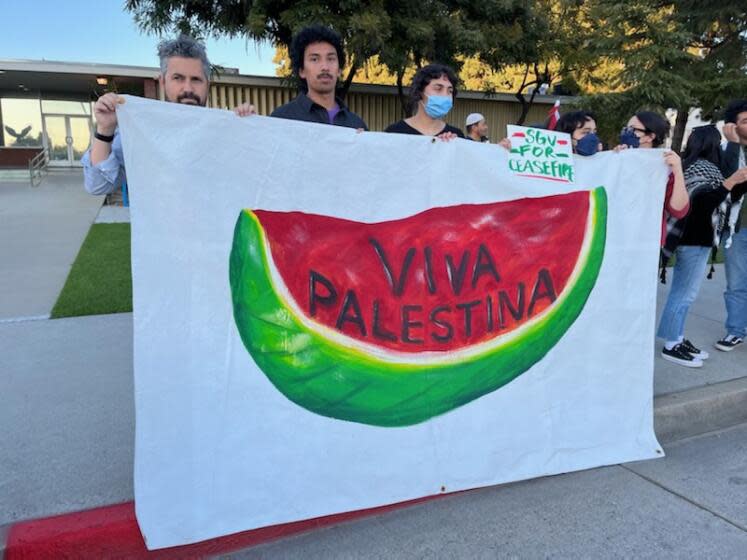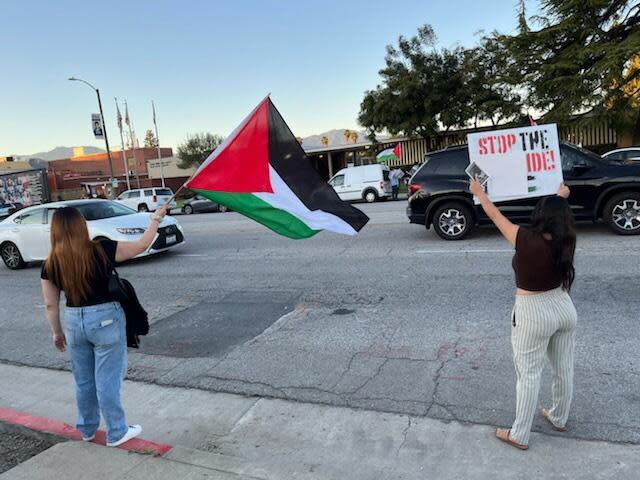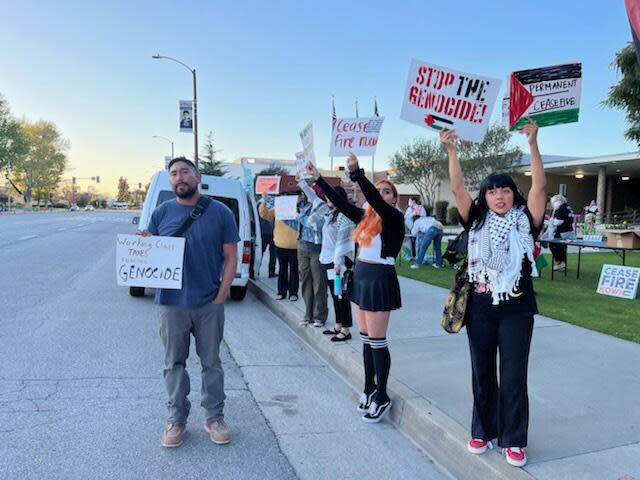Column: Why many Latinos are calling for a cease-fire in Gaza

Kaffiyehs. Palestinian flags. Signs and chants. The rally in front of El Monte City Hall on Tuesday evening seemed at first glance like many that have taken place across the U.S. since Oct. 7.
But some in the crowd of about 50 people wore sweatshirts with the logo of Mexico's national soccer team. A sign said, "From Mexico to Palestine / Border Walls Have to Go." A banner featuring a watermelon — a Palestinian solidarity symbol — also bore the phrase "Viva Palestina," an homage to Frida Kahlo's last painting.
The scene didn't surprise me. For the past six months, my social media feeds have been flooded with Latinos expressing support for Palestinians. Friends who have never been politically active are now attending rallies in Boyle Heights, Santa Ana and other Latino-majority neighborhoods and cities. They're decrying American aid to Israel and denouncing Prime Minister Benjamin Netanyahu as a butcher for the nearly 33,000 Palestinians — many of them women and children — who have been killed by Israeli airstrikes and military operations, according to Gaza's Health Ministry.
Read more: This small, Latino city took a public stance in support of Palestinians. Will others follow?
Netanyahu has said that Israel must achieve "total victory" after Hamas-led attacks killed around 1,200 people on Oct. 7, with around 200 taken hostage, according to Israeli authorities. Over 100 U.S. cities have called for a cease-fire in Gaza, from big-city progressive stalwarts like Seattle, Oakland and San Francisco to towns in Ohio and Vermont. In Southern California, almost all the cities that have joined the movement — Pomona, Cudahy, Bell, Bell Gardens, Montebello and Santa Ana — have been municipalities with Latino populations of over 65%.
On Tuesday, activists asked El Monte to join the list.
The visibility of so many Latinos at pro-Palestinian actions in Southern California represents a historic rupture in the longstanding political alliance between Latinos and Jews, who lived side by side on the Eastside for decades. They banded together in 1949 to make Edward Roybal the first Latino city council member in Los Angeles in the 20th century, helped Tom Bradley become the city's first Black mayor and propelled Antonio Villaraigosa’s 2005 mayoral victory. Groups like the American Israel Public Affairs Committee, or AIPAC, regularly sponsor trips to Israel for Latino legislators and have hosted outreach summits to foster the alliance.
Spokesperson Marshall Wittman didn't offer much when I asked for AIPAC's thoughts on Latino-majority cities passing cease-fire resolutions.
“There is widespread support for Israel in the Latino community,” he replied via email, citing an AIPAC-affiliated political action committee's endorsement of "nearly half of the Congressional Hispanic Caucus.”
Such a statement, however, belies fears among American Jewish leaders that they’re losing Latinos over the Palestinian question.

A report released last year by the American Jewish Committee warned that the sympathies of young Latinos for Palestinians were “a generational challenge” and a “potential impediment” for Jewish-Latino relations and that “Israel being a fighter on behalf of the oppressed is clearly not the perception for this generation of Latino leaders.”
A 2022 study by Fuente Latina, a nonprofit whose mission is to “provide accurate coverage of Israel, the Middle East and the Jewish world,” found that Latino support for Israel has declined since 2010 and that a perceived “overwhelming and fundamentally unfair power imbalance” between Israel and Palestinians was brought up by study respondents “over and over again.”
Meanwhile, a Public Policy Institute of California survey found that Latinos in the state were the ethnic group that most favored decreasing U.S. military aid to Israel and most often chose "strongly support" as an option on a question about a cease-fire in Gaza.
Anticolonialist Latin American intellectuals have long sympathized with the Palestinian cause. Chicano organizers have traveled to Gaza and the West Bank for decades in cross-cultural exchanges. But what’s happening right now in Southern California isn't any of that, said Cal State Fullerton Chicana and Chicano Studies professor Alexandro Jose Gradilla.
Read more: California city council meetings stir up heated debate over calls for Gaza cease-fire
"It's not just my radical students. It's my students in the hoodie from Anaheim. It’s jolting for them to see because it triggers ancestral stories of land theft, stolen resources and massacres," Gradilla said of the images of dead bodies and rubble coming out of Gaza.
"The Whittiers and Downeys aren’t doing anything," he continued. "It’s the blue-collar cities. There, you’re more likely to have contact with Arab folks. [Latinos] aren’t really coming in contact with the Jewish community like you would see 50 years ago. That is gone. That has created a shift on Israel.”
While the surge in Latino activism over Gaza is grassroots, the ceasefire resolutions from Latino-majority city councils have spread mostly because of Rida Hamida, a longtime Orange County community activist who has also served as a staffer for state legislators and members of Congress. She's the executive director of Latino & Muslim Unity, a nonprofit best known for Taco Trucks at Every Mosque, handing out free halal tacos at voter registration events and COVID-19 vaccine drives across the state.
Hamida, who has family in the West Bank and whose parents own a home there, said she began approaching council members to endorse cease-fires after grieving about what was happening in Gaza. "I told them, 'You're Latino-majority cities, but I'm Palestinian and I've served and worked alongside you in your cities. We need to serve one another and defend one another.'"
She has offered receptive council members suggestions on how to write resolutions, assuaging any fears of blowback by pointing out that their constituents get it.
"When I talk to vecinas [female neighbors], connections between Latin America and Palestine are easy," Hamida said. "Now, there is a shift, not only because of the Palestinian movement. It’s because of the movement within Latinos."
At the El Monte rally, Kimberly Primero handed out stickers that read, "How Many Have to Die?" and "Viva Viva Intifada." A few months ago, the 27-year-old attended a similar protest in front of Rep. Grace Napolitano's office in El Monte. Only two others showed up.
"A lot of issues have happened in Mexico and Central America that affect people here, and it gets glossed over," said Primero, a data entry clerk who wore a necklace with a charm of Handala — a cartoon character of a barefoot, downtrodden boy embraced by Palestinians as a symbol of their resilience. "Seeing this today makes me very optimistic and happy."

The crowd spilled out of the chambers during the council meeting, which almost never happens in El Monte. Hamida passed out falafel and shawarma sandwiches. Many snapped their fingers in approval as dozens of speakers — almost all Latino — urged council members to vote for a cease-fire.
"Show us that you care," said 25-year-old El Monte resident Giselle Barbosa, who had held a "Stop the Genocide" sign at the rally while her 18-year-old sister Jasmin waved the Palestinian flag. "Show us that you have empathy. Let El Monte be on the side of history that advocated for justice."
"I hope to be proud tomorrow of the great city of El Monte," Rene Jimenez said. "I know you guys are going to do us right."
The only Latino who spoke against the proposed resolution was former El Monte mayor Andre Quintero, who said over boos and cries of "¡Fuera!" (Get out!) that he had visited Israel and that the country has a right to protect itself, "just like you [council members] have the duty to protect El Monte."
Read more: How the Israel-Hamas war continues to divide California's Democrats
After two hours of comments, the council finally discussed the resolution while audience members recorded on their smartphones.
Mayor Jessica Ancona asked that the resolution — per Hamida's suggestion — call for a "permanent" cease-fire and mention the number of women and children killed and how many Palestinians have been displaced. "I think it's important that we add these numbers," Ancona stated in a calm voice, "as to not dehumanize what is going on in the Middle East."
Councilmember Victoria Martinez Muela requested a mention of Israelis killed by Hamas. "It speaks to my heart and speaks to humanity," she said over snickers from the audience.
Councilmember Martin Herrera disclosed that after Oct. 7, he and his colleagues had wrestled with whether to introduce a resolution denouncing Hamas, ultimately deciding not to. The issues surrounding a cease-fire motion had "kept me up nights," he said.
"Your stories make me cry for Palestinians," he told the audience, "but I can't forget the wails of Israeli families who also experienced some of those atrocities." Some people groaned in response, as Ancona asked for silence and respect.
No other council member spoke. The vote was unanimous, 7-0. The crowd cheered, chanted "¡Viva Palestina!" and left the chambers.
After a five-minute recess, the El Monte City Council meeting resumed, back to its regular business. Almost no audience members remained.
This story originally appeared in Los Angeles Times.


